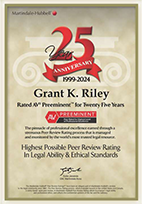On behalf of Riley | Ersoff LLP posted on Tuesday, February 28, 2017.
Lead poisoning should be a concern for everybody, especially families with young children. This is because lead poisoning can lead to long-term problems such as learning disorders that affect a child’s ability to thrive. It can also affect every organ within the body, including your heart and lungs.
The worst part is that lead poisoning tends to hit the people who are least capable of defending themselves against it due to poverty or a lack of safe places to live. For this reason, we are making it a priority to spread the word about the dangers of lead and what you can do to protect your family when it is in your residence.
What Causes Lead Poisoning?
People often think that poisoning happens fast like when a kid swallows antifreeze on accident. However, lead poisoning usually happens slowly over a long period of time. There are lots of things that may contain lead. These include paint, dirt, food and even toys that were made in other countries.
Touching, eating and breathing these things allows lead particles to enter the body. Since lead is toxic, it creates problems in the brain, kidneys and other parts of your body. The health problems caused by lead poisoning usually begin once there is already a large amount of lead built up in the body. In some cases, this damage can be permanent.
Who Is At Risk?
Anyone can get lead poisoning. Kids are most at risk because their bodies are still developing. Young children also tend to place items in their mouth that expose them to lead. For example, they may chew on paint chips that have flaked off of the wall in their room.
Your family is at risk for lead poisoning if you live in a home built before 1978. This is because homes before then were painted using lead-based paint. Homes built before 1950 are even more likely to contain lead.
What Can You Do?
Since lead poisoning does not always cause obvious symptoms in the early stages, you need to have your family’s blood tested if you fit the risk factors. Children under six years old should be tested during their well child visits, but you may need to ask their doctor to do the test.
Your home can also be tested for lead, and you should check with your child’s daycare if the building was built before 1978. If you do find that lead exists in your home or your family has high levels in their blood, you will need to consult with an experienced attorney.
It is important to have support when you are dealing with lead poisoning since stopping exposure is the best way to limit the damage. Reach out for help to deal with landlords and other individuals who refuse to assist you with stopping the dangers of lead from harming your family.
The post What every family should know about the dangers of lead poisoning appeared first on Riley | Ersoff LLP.
















